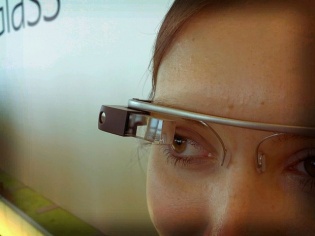-
Rizwan Memon
17:36 01st Feb, 2013
Google's Camera Equipped Glasses To Have Bone Conduction? | TechTree.com
Google's Camera Equipped Glasses To Have Bone Conduction?
Appearing straight out of a sci-fi movie, the device which looks like a small wear has a camera and a screen to bring augmented reality to the wearer.

In June 2012, Google demoed what it called Project Glass. Using sky diving and mountain biking videos webcast live, Google showed what could be possible by a gizmo which records sights from a camera placed alongside your eye, thus getting a footage that is as close to what your eye can see. The press and everyone else were suitably wowed. But camera mounted near the eye is nothing new in itself - where it gets really interesting is with the augmented reality being made possible by using the 'glasses' as a display. The device can behave like a smart phone, and allow the user to use voice controls (or even eye movements) to interact with the device. The glass may look small, but given its proximity to the eye, the perceived display will occupy your field of vision.
Now, the latest we are hearing is that Google Glass maybe come with a technology called bone conduction, which delivers sound directly to your inner ears though the bones of your skull, rather than though your eardrums.
The wearable glasses have arrived at the office of the US Federal Communications Commission (FCC) for testing and approvals. Apparently, Google has politely requested FCC to keep this device under wraps, citing loss of competitive advantage. However, from the limited information that the FCC has released about the device, we can make a few informed guesses.
First up the device most likely does not have 3G or 4G radio, however it does have Wi-Fi and Bluetooth connectivity. Which means you might have to be in a Wi-Fi hotspot to use the glasses. Moreover, the Wi-Fi standards adopted are the slower 802.11b and 802.11g, with a noticeable lack of the faster 802.11n standard.
What leads some credence to the speculation of bone conduction is that one of the FCC document mentions "integral vibrating element that provides audio to the user via contact with the user's head". This can be further validated with a Google patent application of a "wearable computing device with bone-conduction speakers".
Google Glass is expected to be priced at around USD 1500 (Rs 80,000 approximately).
- DRIFE Begins Operations in Namma Bengaluru
- Sevenaire launches ‘NEPTUNE’ – 24W Portable Speaker with RGB LED Lights
- Inbase launches ‘Urban Q1 Pro’ TWS Earbuds with Smart Touch control in India
- Airtel announces Rs 6000 cashback on purchase of smartphones from leading brands
- 78% of Indians are saving to spend during the festive season and 72% will splurge on gadgets & electronics
- 5 Tips For Buying A TV This Festive Season
- Facebook launches its largest creator education program in India
- 5 educational tech toys for young and aspiring engineers
- Mid-range smartphones emerge as customer favourites this festive season, reveals Amazon survey
- COLORFUL Launches Onebot M24A1 AIO PC for Professionals







TECHTREE